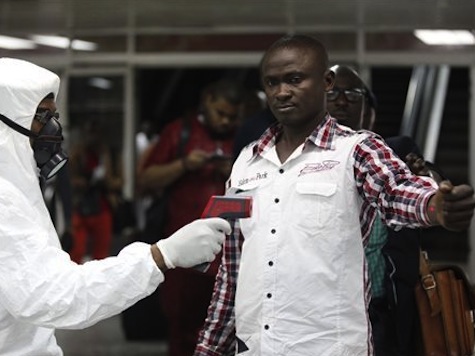With the world on high alert as West Africa continues to struggle against the wages of the Ebola virus, the World Health Organization (WHO) is warning affected countries to take extra precautions in containing the threat to their region. In response to the threat, the governments of Latin America are preparing quarantine spaces and airport screenings against potential carriers.
Argentine news outlet Infobae reports that, while most consider the threat to Latin America from the Ebola virus low, a number of nations in South America have begun taking precautions to prevent the potential spread of the virus from an international traveler–as occurred in Nigeria, where a Liberian passenger brought the virus to Lagos and has spread the virus to 11 others. He died of Ebola shortly after landing.
Argentina has likely gone the furthest in preparing for a potential outbreak, designating seven hospitals in urban areas as “Ebola-only” quarantine centers should any cases arise in the country. Buenos Aires’ Minister of Health Alejandro Collia told Infobae that the South American capital is “on an epidemic alert.” The alert means specific precautions have been taken in the capital: “specialty hospitals have already been designated and information has been distributed to medical teams on how to diagnose and treat a suspected case, how to prevent contraction [of the virus], and how to notify authorities of the presence of someone so gravely ill.”
Argentina does not, the government notes, have direct commercial flights to and from the affected areas, but it remains concerned that international travelers transferring in the country could bring the disease there. Patrick Sawyer, the Liberian man who brought Ebola to Nigeria, had landed in Lagos to transfer to a flight to Minnesota.
Other nations have not gone so far as to establish designated medical areas for Ebola patients. Instead, countries like Chile and Brazil are focusing on protecting their borders and points of entry. In Chile, the government has noted that they are among the nations of least concern for the World Health Organization; officials, nonetheless, note in a statement that “the Ministry of Health is reinforcing vigilance capacities already instead–as well as detention and management of cases–in points of entry around the country.”
Agencia Brasil reports that Brazil is reacting similarly. The nation, the outlet notes, is “tightening airport and port safety procedures so that potential cases can be identified,” as well as establishing “contingency plans” at medical institutions and putting embassies in Africa on alert for Brazilian nationals in those areas exhibiting Ebola symptoms. Central America, particularly Honduras, has also responded to the Ebola threat by announcing an increase in security at airports and points of entry.
While the Ebola outbreak is believed to have begun in February or March, it was not until August 8 that the World Health Organization declared the outbreak an “international health emergency.” The group called for an increase in security to screen potential Ebola carriers traveling to areas outside of those hardest hit by the virus; many believe air travel to be the likeliest way for the virus to spread outside its current borders.
The WHO announced Monday that it also strongly recommended that affected countries close off major border crossings, airports, and seaports, and conduct screenings on those exiting the country to prevent the spread of the virus.
While Latin American governments announce precautionary measures against the virus, the United States government has remained relatively quiet on potential security initiatives that could help keep the virus at bay. When approached by Breitbart News, the TSA, Federal Aviation Authority, and Centers for Disease Control all failed to elaborate on specific measures used to keep Ebola carriers from entering the country or contaminating others.

COMMENTS
Please let us know if you're having issues with commenting.